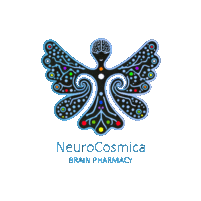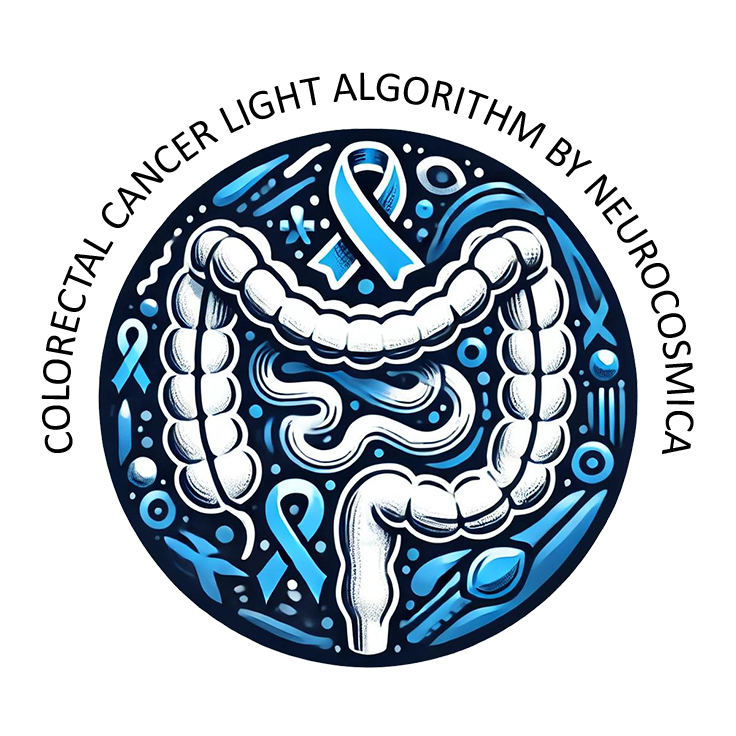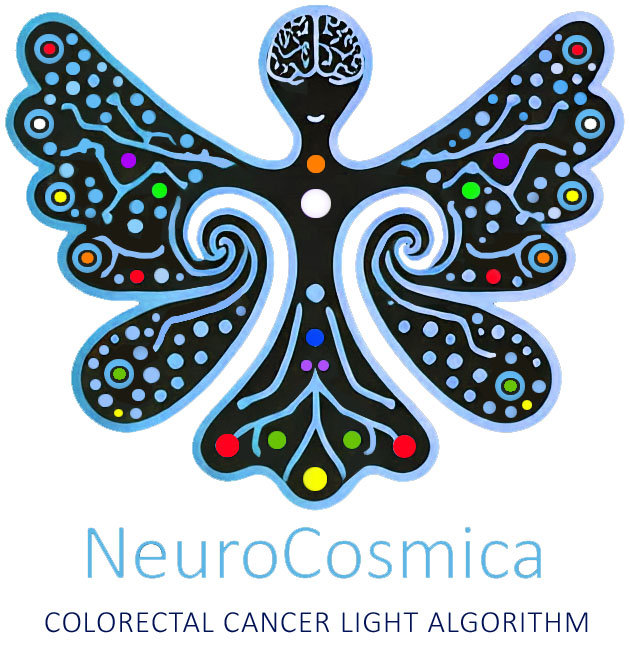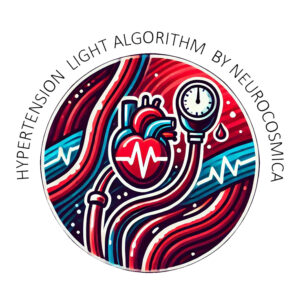NeuroCosmica: Colorectal Cancer Light Algorithm
Brief Description of Colorectal Cancer: Colorectal cancer, also known as bowel cancer, develops in the colon or rectum, which are parts of the large intestine. It often begins as small, noncancerous clumps of cells called polyps that form on the inside of the colon or rectum. Over time, some of these polyps can become cancerous. Symptoms may include changes in bowel habits, blood in the stool, abdominal discomfort, and unexplained weight loss. Early detection through screening is crucial for effective treatment.
Causes of Colorectal Cancer: Several factors can contribute to the development of colorectal cancer:
- Genetic Factors: Family history of colorectal cancer or inherited syndromes like Lynch syndrome and familial adenomatous polyposis.
- Age: The risk increases with age, particularly after 50.
- Diet: A diet high in red and processed meats and low in fiber can increase the risk.
- Lifestyle Factors: Lack of physical activity, obesity, smoking, and heavy alcohol use can contribute to the risk.
- Chronic Conditions: Inflammatory bowel diseases such as Crohn’s disease and ulcerative colitis.
Recommended Exercise Routine for Individuals with Colorectal Cancer: Regular physical activity can help manage symptoms, improve overall well-being, and support recovery. Here are some exercise recommendations:
- Aerobic Exercise: Engage in moderate-intensity aerobic activities such as walking, swimming, or cycling for at least 150 minutes per week to improve cardiovascular health and reduce stress.
- Strength Training: Include strength training exercises two to three times a week to build muscle mass and maintain bone density. Use light weights, resistance bands, or body-weight exercises like squats and push-ups.
- Flexibility Exercises: Incorporate stretching exercises to improve flexibility and reduce muscle tension. Yoga and gentle stretching can also enhance relaxation.
- Balance Exercises: Perform balance exercises to prevent falls and improve stability. Simple exercises include standing on one foot and heel-to-toe walking.
- Consistency: Maintain a regular exercise routine, but listen to your body and avoid overexertion. Modify exercises as needed based on energy levels and physical condition.
Healthy Diet Recommendations for Individuals with Colorectal Cancer: A balanced diet can support overall health, enhance recovery, and improve the effectiveness of treatments. Here are some dietary recommendations:
- Fruits and Vegetables: Consume a variety of colorful fruits and vegetables rich in vitamins, minerals, and antioxidants to support immune function and reduce inflammation.
- Whole Grains: Choose whole grains like brown rice, quinoa, oats, and whole wheat bread to provide sustained energy and support digestive health.
- Lean Proteins: Include sources such as fish, poultry, beans, legumes, and low-fat dairy to support muscle health and repair.
- Healthy Fats: Incorporate healthy fats from sources like olive oil, avocados, nuts, and seeds to support brain health and reduce inflammation.
- Hydration: Drink plenty of water to stay hydrated and support overall bodily functions.
- Fiber: Eat high-fiber foods to promote digestive health and prevent constipation. Include foods like fruits, vegetables, whole grains, and legumes.
- Antioxidant-Rich Foods: Include foods rich in antioxidants, such as berries, dark leafy greens, and green tea, to help protect cells from damage.
- Limit Processed Foods: Reduce intake of processed foods, sugary drinks, and high-fat snacks to avoid additional strain on the body.
- Small, Frequent Meals: Eat smaller, more frequent meals to help manage symptoms and maintain energy levels.
NeuroCosmica: Potential Benefits of Light Algorithms for Colorectal Cancer
1. Enhancing Mood and Reducing Depression: Colorectal cancer can bring emotional challenges such as depression. NeuroCosmica’s Light Algorithms can use uplifting colors like yellow and green to enhance mood, reduce feelings of depression, and promote a more positive outlook.
2. Reducing Anxiety and Stress: Managing colorectal cancer often brings significant anxiety and stress. Light therapy with calming colors such as blue and violet can help alleviate these feelings, promoting relaxation and a sense of calm.
3. Improving Sleep Quality: Sleep disturbances are common in individuals with cancer. NeuroCosmica’s light therapy can help regulate circadian rhythms and improve sleep quality, leading to better rest and overall health.
4. Supporting Immune Function: A strong immune system is crucial for overall health, especially for individuals undergoing cancer treatment. Light therapy can support immune function, helping the body to better manage symptoms and respond to treatments.
5. Boosting Energy Levels: Fatigue is a common issue in colorectal cancer. Light therapy can boost energy levels, helping individuals feel more active and engaged in their daily activities.
6. Promoting Emotional Balance: Emotional stability is crucial for managing colorectal cancer. Light Algorithms can help regulate emotions, preventing mood swings and fostering a balanced emotional state.
7. Enhancing Mental Clarity and Focus: Managing the demands of cancer treatment can cause stress and affect cognitive functions. NeuroCosmica’s light therapy can enhance mental clarity and cognitive functions, making it easier to stay focused and productive.
8. Encouraging Positive Mindset: A positive mindset can significantly impact the well-being of individuals with colorectal cancer. Light therapy can promote feelings of optimism and resilience, helping them approach their condition with a positive attitude.
9. Enhancing Social Connections: Light therapy can improve mood and social interactions, helping individuals form healthier and more positive relationships with family and friends.
10. Supporting Physical Health: By reducing stress and improving sleep, NeuroCosmica’s light therapy can contribute to better physical health, supporting overall well-being during and after cancer treatment.
11. Fostering a Sense of Control: Colorectal cancer can make individuals feel out of control. Light therapy can help them feel more in control of their emotional and physical states, providing a sense of empowerment during their health journey.
12. Reducing Risk of Mental Health Issues: Early intervention with light therapy can help reduce the risk of developing more serious mental health issues by addressing anxiety, depression, and stress early on.
13. Encouraging Mindfulness and Relaxation: Integrating light therapy with mindfulness practices can help individuals with colorectal cancer stay present and calm, reducing stress and improving their ability to cope with daily pressures.
14. Creating a Positive Environment: Using light therapy to create a serene and uplifting environment can provide a healing space that supports the overall well-being of individuals with colorectal cancer.
Integrating NeuroCosmica’s Light Algorithms into the care plan for individuals with colorectal cancer can provide a unique and effective approach to enhancing their overall well-being. The holistic benefits of light therapy address various aspects of health, helping to improve mood, reduce stress, support immune function, and ultimately improve the quality of life for those managing colorectal cancer.
Important Note: Remember that NeuroCosmica treatments and/or recommendations should not replace the recommendations, treatments, and prescriptions of your doctor, specialist, psychologist, or other professional who is currently treating you.





Reviews
There are no reviews yet.